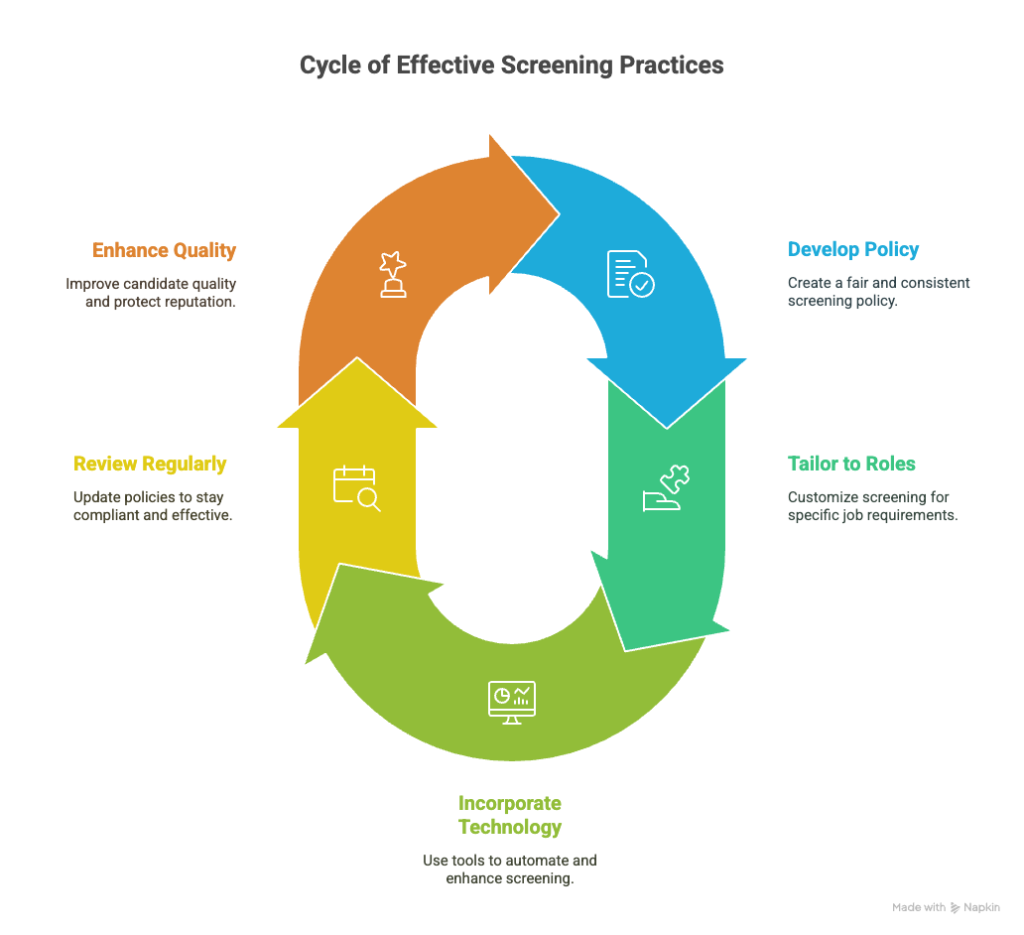In the competitive world of staffing, ensuring you have the right candidates for the job is crucial—but it can also be fraught with potential pitfalls. Staffing firms are often on the front lines, responsible for screening applicants and matching them to the appropriate job openings. However, even small mistakes in the screening process can lead to significant consequences, from hiring the wrong candidate to violating laws and risking lawsuits. This guide explores the most common staffing screening pitfalls, helping you avoid these mistakes and improve your firm's screening process.
Key Takeaways
- Ensure thorough background checks to avoid hiring unqualified or risky candidates and reduce the likelihood of negligent hiring lawsuits.
- Pay attention to ban-the-box laws to avoid legal trouble and ensure fair hiring practices by removing questions about criminal history from initial applications.
- Follow the complete adverse action process by notifying candidates about potential disqualifications based on their background check and allowing them to respond.
- Don't overlook the importance of soft skills like communication and teamwork when evaluating candidates, as they are crucial for cultural fit and overall success.
- Regularly train your staff on updated screening practices and legal requirements to minimize errors and enhance the overall efficiency of the hiring process.
Introduction
The staffing industry plays an essential role in connecting businesses with the talent they need. As a staffing firm, you are tasked with placing the right candidate in the right job—a responsibility that impacts both business success and individual careers. Screening candidates effectively is not just about ticking boxes; it’s about ensuring a match that counts in terms of skills, reliability, and legal compliance.
Getting candidate screening right can save your firm from expensive errors and legal challenges. A rigorous approach can prevent long-term issues like repeated turnover and negligent hiring claims. Yet, screening mistakes can still occur, even with the best intentions. These errors can cause hiring mismatches and can expose your firm to legal scrutiny.
Let's delve deeper into these common pitfalls so you can steer clear of them. Understanding these mistakes is the first step toward refining your screening process and ultimately contributing to smoother and more successful placements.
EXPERT INSIGHT: In staffing, I've come to find that even the smallest missteps in screening have the greatest potential impact—not merely with regard to businesses, but with regard to people's lives. It's not merely preventing lawsuit exposure or checking compliance boxes; it's about keeping us fair and respectful with regard to candidates while protecting the clients we serve. I've witnessed first-hand what it means to miss soft skills or expedite a background check and watch what might've been the ideal fit go awry. When we're slower, we're more compliant, and we listen closer, we're making connections that fill jobs but also improve workplaces. How careful is your screening process with regard to fostering both trust and long-term future? - Charm Paz, CHRP
Common Staffing Screening Pitfalls
Inadequate Background Checks
Performing thorough background checks is essential. Skipping this step can lead to hiring unqualified or even dangerous candidates. A lack of diligence here can result in negligent hiring lawsuits, seriously tarnishing your firm’s reputation. You need a structured approach: verify education, check past employment, and run criminal background checks where legal. Yet, remember the Equal Employment Opportunity Commission (EEOC) guidance; ensure you're compliant with their regulations to avoid discrimination claims.
Negligent Hiring Lawsuits
Negligent hiring occurs when an employee causes harm, and the employer is found responsible due to failure in proper vetting. Imagine hiring someone without checking their criminal history and they harm a client. That’s a lawsuit waiting to happen. Avoid this by documenting all your vetting processes. Use tools that provide comprehensive report details, and cross-reference the provided information with official sources.
Ignoring Ban-the-Box Legislation
Ban-the-box laws mean you can't ask about criminal records early in the hiring process. These laws are becoming more common. Ignoring them can lead to hefty fines and legal trouble. To comply, review the legislation in every state you operate in. Train your staff to recognize the restrictions and adjust your hiring forms accordingly, ensuring compliance from the get-go.
Incomplete Adverse Action Process
Adverse action occurs when you decide not to hire someone based partly on their background check. Problems happen when firms skip notification steps. You must inform the candidate in writing of their potential disqualification, give them time to respond, and then send a final decision notice if you proceed. Use a checklist to ensure every step is completed, maintaining fairness and legal compliance.
Overlooking Soft Skills
Soft skills like communication and teamwork are crucial for many roles. Relying solely on technical skills means you might miss great candidates who would excel in your company culture. During interviews, pose questions that reveal candidates' adaptability and problem-solving abilities. Consider soft skills equally alongside technical ones, broadening the scope of your assessments.
Lack of Ongoing Training for Staff
Staff without updated knowledge can make costly errors. Screening laws and best practices evolve; your team should too. Schedule regular training sessions covering the latest legal requirements and industry trends. Keeping your team informed helps minimize mistakes and enhances the overall efficiency of the screening process.
These pitfalls are common but avoidable. Ensuring your screening processes are thorough and compliant will protect your firm’s reputation and enhance your hiring success. Keep these points in mind as you refine your approach for better results.
Solutions and Best Practices for Effective Screening
A well-structured screening policy is your first line of defense. Develop a comprehensive approach that applies consistently to every candidate. This ensures fairness and reduces potential biases. Take the time to define what each role truly requires and tailor the screening process accordingly.
Incorporate technology to streamline your efforts. Consider platforms that automate background checks, verify credentials, and assess skills. These tools save time and reduce human error. They can also provide valuable insights into trends and patterns within your hiring process.
Don't let your policies gather dust. Regular reviews keep your practices aligned with current laws and industry standards. Look at recent legal changes, such as updates to background check regulations and privacy laws. Use this information to refine your approach and stay compliant.

By making these changes, you can minimize errors, enhance candidate quality, and protect your firm's reputation. A proactive strategy is critical to successful staffing. How are you ensuring your screening process is both thorough and up-to-date? It's worth considering.
Conclusion
Identifying staffing screening mistakes can significantly strengthen your firm's hiring practices. A successful approach starts with scrutinizing your current processes for potential weaknesses. Are your background checks comprehensive enough, or have you trivialized the importance of soft skills? Each oversight represents a threat to your firm's reputation and legal standing.
Take immediate action by revisiting and refining your screening strategies. This is not just about compliance; it's about ensuring the right fit between candidates and job roles. Implement changes where necessary, utilizing available technology to streamline and fortify your efforts.
Look to the future with an eye on improvement. Regular policy reviews and staff training can keep your screening methods current and effective. Engage with industry best practices to enhance both compliance and candidate quality. By committing to these steps, you're setting a foundation for successful and responsible staffing—and that’s a goal every firm should strive for.
Frequently Asked Questions (FAQs)
What are the legal risks of incomplete background checks?
Incomplete background checks can expose you to hiring unsuitable candidates, potentially leading to workplace violence or theft. Additionally, you might face legal liability for negligent hiring if employees harm others. Consistently conducting thorough checks is crucial to mitigate these risks.
How many states have ban-the-box laws?
As of now, 37 states have ban-the-box laws. These laws restrict employers from asking about criminal history on initial job applications, allowing candidates to be considered based on qualifications first.
Can staffing agencies be sued for not drug testing?
Staffing agencies might face lawsuits if a client's business is negatively affected due to placement of a worker who fails to pass a drug test later. However, the likelihood of a lawsuit also depends on the terms of the agreement between the agency and the employer.
What’s the penalty for FCRA violations?
FCRA violations can lead to substantial penalties, including actual damages, statutory damages of $100 to $1,000 per violation, punitive damages, and attorney fees. It is essential to adhere strictly to FCRA regulations during background checks to avoid legal risks.
How to verify education for international candidates?
Verify education by contacting the candidate's educational institution directly. You can also use third-party services specializing in international education verification to ensure you have accurate information.
What steps can you take to ensure a complete background check?
To ensure completeness, always include criminal history, employment verification, education verification, and reference checks. Using a reputable background check service can streamline this process.
How often should you update your background check policy?
Review and update your policy annually or whenever there are changes in relevant laws. Staying current ensures compliance and reduces legal risks.
What should you include in a background check for high-risk positions?
For high-risk positions, include a comprehensive review of criminal background, credit history, driving records, and employment history. These checks help ensure candidates meet all safety and security requirements.
Is it necessary to inform candidates of background checks?
Yes, always inform candidates about the background check process and obtain their written consent. This practice not only ensures compliance with FCRA regulations but also maintains transparency in your hiring process.
Still have questions?
Get in touch with our team today for a personalized demo and discover how our tailored volume pricing and packages can drive results for your business!
How useful was this page?*
Note: your comments are anonymous. We use them to improve the website. Do not include any personal details.
Visit our FCRA Compliance Tool or leave a message here if you need a response.
From the blog Explore the GCheck Content Hub

Navigating the New York Education Background Check Process: A 2026 Operational Guide
28 Jan, 2026 • 18 min read
Florida Education Background Checks: 2026 Compliance Guide for School Districts
27 Jan, 2026 • 20 min read
Texas Construction Background Check Requirements: Compliance and Best Practices for 2026
27 Jan, 2026 • 19 min readThe information provided in this article is for general informational and educational purposes only and should not be construed as legal advice or a substitute for consultation with qualified legal counsel. While we strive to ensure accuracy, employment screening laws and regulations—including but not limited to the Fair Credit Reporting Act (FCRA), Equal Employment Opportunity Commission (EEOC) guidelines, state and local ban-the-box laws, industry-specific requirements, and other applicable federal, state, and local statutes—are subject to frequent changes, varying interpretations, and jurisdiction-specific applications that may affect their implementation in your organization. Employers and screening decision-makers are solely responsible for ensuring their background check policies, procedures, and practices comply with all applicable laws and regulations relevant to their specific industry, location, and circumstances. We strongly recommend consulting with qualified employment law attorneys and compliance professionals before making hiring, tenant screening, or other decisions based on background check information.


